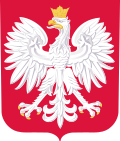 |
|---|
The seventh term of the Government of the Republic of Poland is the term of the Government that ran from 8 November 2011 to 11 November 2015. [1]
 |
|---|
Related topics |
The seventh term of the Government of the Republic of Poland is the term of the Government that ran from 8 November 2011 to 11 November 2015. [1]
| Name | Party | Notes | ||
|---|---|---|---|---|
| Senior Marshal | Józef Zych | Polish People's Party | ||
| Marshal | Ewa Kopacz | Civic Platform | Served from 8 November 2011 to 22 September 2014 | |
| Marshal | Radosław Sikorski | Civic Platform | Served from 24 September 2014 to 23 June 2015 | |
| Marshal | Małgorzata Kidawa-Błońska | Civic Platform | Served from 25 June 2015 to 11 November 2015 | |
| Deputy Marshals | Cezary Grabarczyk | Civic Platform | ||
| Eugeniusz Grzeszczak | Polish People's Party | |||
| Marek Kuchciński | Law and Justice | |||
| Wanda Nowicka | Non-attached member | |||
| Jerzy Wenderlich | Democratic Left Alliance | |||
| Elżbieta Radziszewska | Civic Platform | |||